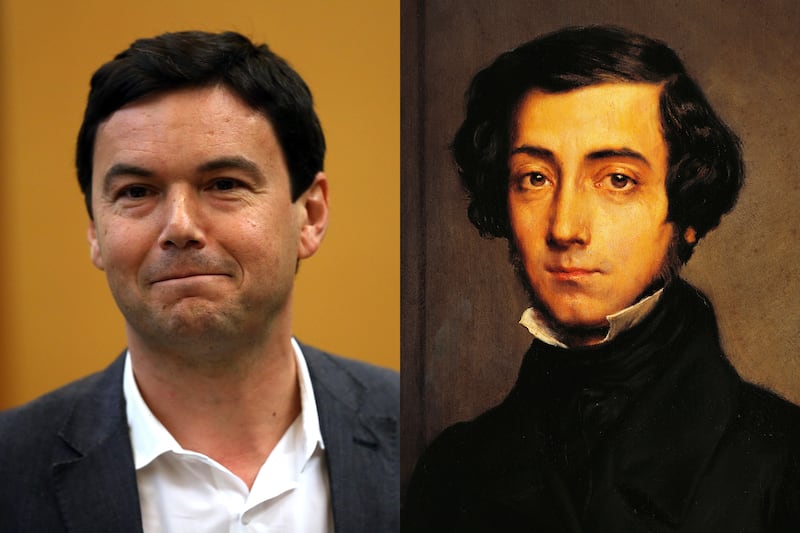No reader of Tocqueville, it is safe to say, will have the final word on Democracy in America. For theorists, pundits, and plain citizens, it is the gift that keeps on giving.

So it is a pleasure to have provoked Arthur Goldhammer’s interest in my word on Tocqueville—and certainly I set out to provoke. It is a disappointment, however, that he brushes aside not only my own points of interest but, more importantly, some of Tocqueville’s own.
Two spirited columns can hardly exhaust the debate. Tocqueville’s subtleties run deep. Nevertheless, on matters such as the logic of equality and the politics of envy, Tocqueville stands firm, and it is worth considering why in greater detail.
I suggested that Democracy in America consistently develops an idea that should persuade us we don’t need a global mass redistribution scheme to avoid historically unprecedented and unshakeable inequalities of wealth. One of the most prominent right-wing criticisms of Piketty on this score is that we can simply use policy to effectively create more upward mobility. Notably, Tocqueville is more pessimistic about this approach than some of his more conservative interpreters would want to believe.
For that reason alone, Tocqueville is at odds with Piketty in an important way that’s not represented by partisans of the typical free-market fable. The fable tells us that if policymakers foster competition and cut taxes, the rest will pretty much work itself out. Tocqueville, by stark contrast, does not believe that approach can prevail. For him, the market has no inherent or internal logic of its own.
Tocqueville emphasizes how American habits carry over into politics much more so than the reverse. This, he contends in turn, is because of the importance of religion to the formation of the American character. Since Americans’ religion organized their mores in accordance with a few general principles, they were able to treat politics as a realm safe for broad experimentation. Tocqueville contrasts that arrangement with the one that prevails in a society where religion makes particular claims on particular laws, tightly narrowing the free play of political ideas and the exercise of political rights.
Because of this active, fruitful political life, Tocqueville says, the Americans naturally brought the same habits of thought and action to economic life. And just as their political life was tumultuous and always in motion, their economic life was characterized by constant competition and uncertainty. Although religion, politics, and economics all presumed the equality of individuals, spiritual life was characterized by peaceful servitude to God, while temporal life was a realm of agitated freedom among humankind.
Never having suffered the barriers to advancement put up by aristocracy, the Americans instead began to discover that invisible barriers rose up in their place. Equality itself was to blame—fostering the competition of all against all, encouraging rashness and speculation, creating systemic uncertainty and market bubbles. Fortunes came and went almost at random.
Amid this anxious furor, the mind and soul envisioned a kind of equality that always eluded the Americans’ mortal grasp—comprehensive, peaceful, and stable. As equality spread, the Americans were encouraged by what seemed to be the increasing perfectibility of the human race. Yet they were also distressed and filled with envy over the slightest inequalities that remained.
Here, Tocqueville makes an important pivot in his story. Although equality threw everyone into exhausting, all-consuming competition, a few of the competitors were more ambitious and talented than the rest. With aristocracy at an end, the barriers to their swift advancement were gone. A meritocracy (though Tocqueville didn’t use that word) quickly formed—rewarded not with honor or titles, as in the aristocratic age, but with money. A “business aristocracy” was born.
But it was not really an aristocracy, because it had no ancient lineages, no multigenerational property holdings, and no deep tradition of shared pride and rulership. Instead of seeking power, it sought merely more money. And when these wealthy winners accumulated unparalleled fortunes, they weren’t quite sure what to do with their leisure time. “The rich in democracies never form a body with its own mores and way of enforcing the same; no opinions peculiar to their own class restrain them, and public opinion urges them on.” They’re just like the rest of us, in other words, only they’ve got more stuff. We all have lots of ambition, but nobody really has lofty ambitions.
Why? Because the end of the aristocratic age has filled us with the optimistic sense that anything is possible and nothing stands in the way of our upward mobility. Yet those big dreams of more wealth, more goods, more pleasure, and more leisure are themselves leftovers of the frame of mind that prevailed in the aristocratic age. “Longings on a vast scale remain, though the means to satisfy them become daily less. The taste for huge fortunes persists, though such fortunes in fact become rare, and on all sides there are those who eat out their hearts in secret, consumed by inordinate and frustrated ambition.”
Then, time drags on. Many generations later, “life is spent eagerly covering small prizes within reach.” Tocqueville underscores: “The few opulent citizens of a democracy constitute no exception to this rule.”
“But if,” he continues later, “while ranks are moving toward equality, men’s education is inadequate or their minds timid, or if trade and industry are hampered in their progress, so that they offer only a slow, hard road to fortune, the citizens, giving up hope of improving their lot by their own efforts, rush to the head of the state and ask for his help.”
This is why Tocqueville puts such a stress on the perils of patronage. Tocqueville is not most concerned that corporate “dynasties of wealth” will seize control of the government through patronage. He is most concerned that the government will dole out patronage for the same reason the French kings of the old regime did—to centralize power by capturing and domesticating powerful people outside of the capital.
Once such a system is up and running, Tocqueville warned, it would become very unstable. Patronage politics breeds resentment. People grow tempted to throw everyone out of office, thinking that only radical measures can reform their corrupt government. They see people just like them being elevated quickly to power while they languish, and they become envious.
This story of Tocqueville’s resonates very strongly, I think, with many Americans’ general sense of what is currently happening in America. Rather than failing to take the possibility of severe inequality seriously, Tocqueville gives a detailed, sophisticated narrative of how such a dismaying development can arise in the midst of unprecedented and durable equality.
The problem, Tocqueville leads us to conclude, is not that substantial private wealth persists for a few in the democratic age. The problem is that when too many people feel defeated by the invisible barriers of equality, society turns to government patronage, which government is only too pleased to provide. And since even the rich are just like us, even some of the most opulent turn to government for a competitive edge they have given up seeking through more and more grueling and uncertain effort.
At that tipping point, a soft but potent kind of despotism arises—notable less for what it compels people to do, and more for the way everyone, whatever their economic class, becomes willingly enlisted into its supremacy. Suddenly, instead of the sharp inequality of wealth, the most startling feature of democratic society is the “servitude” toward the state that all classes have slipped into. Increasingly, the opulence of the few is dependent on the largesse and special treatment of the government. Rather than a wealthy elite of unprecedented independence and power, the ultra-rich turn out to be in a position of unprecedented dependence on government.
That is a vision that winds up somewhere Piketty’s does not—even though Tocqueville begins by taking the prospect of inequality as seriously as Piketty. The difference is that, for Tocqueville, the centralization of capital and the stagnation of productivity is triggered by the capture of the wealthy within the politics of patronage.
That means the solution to the same problems Piketty worries about must, by Tocqueville’s lights, be radically different from what Piketty suggests. Merely hacking away at the bank accounts of the rich will not suffice—even though, again, Tocqueville would insist that an abstract economic idea like the Laffer curve is dangerously disconnected from the foundations of political wisdom.
Instead of adopting policies rooted in the progressive or free-market fables about how to hasten fuller equality, Tocqueville counsels that politics must cease to be the realm where the wealthy and the not-so-wealthy are tempted to go to find the fast path to advancement or prosperity. At the same time, political power must be decentralized, not because government is bad, but because our political rights will atrophy if we do not constantly exercise them. After all, it is those habits that fuel our economic vigor, on Tocqueville’s telling. The real road to equality in freedom may be hard, but it will lead us to where we want it to go.
These points of Tocqueville’s are contestable, but the force of his logic is strong. And if Tocqueville is right, then Piketty is mistaken, despite the impressive scope and sophistication of his work.
What’s more, if Tocqueville is right, then only in the fullness of time—if then—will we ever be rid of a tiny economic and financial elite. Even if they are squeezed out of politics as patronage is rolled back, they will continue to concentrate wealth in private and corporate hands. And if recent history is any guide, they will get better and better at preserving and passing on their wealth—even as they give more and more of it away through philanthropic and social-responsibility programs.
That prospect will continue to feel intolerable to many of Piketty’s greatest enthusiasts. They, I believe, will want to impose a universal tax on great wealth simply because the inequality itself offends them. Ultra-rich people who launch a headlong retreat from political affairs will not be immune.
For Tocqueville, succumbing in that way to the politics of envy would be a grave mistake—especially if patronage politics is left untouched out of some strange kind of trust in the ability of government to do unimpeded good if only policy is formulated “correctly.” For those who agree, Piketty has made a big splash in an arena where the stakes are very high indeed.
It is not surprising that these stakes would lead to an intense, even occasionally angry, debate. Hopefully, however, we may all find a way to check the excesses of our pride and our envy, and reclaim our societies from at least those distortions and abuses that now seem evident to all.






